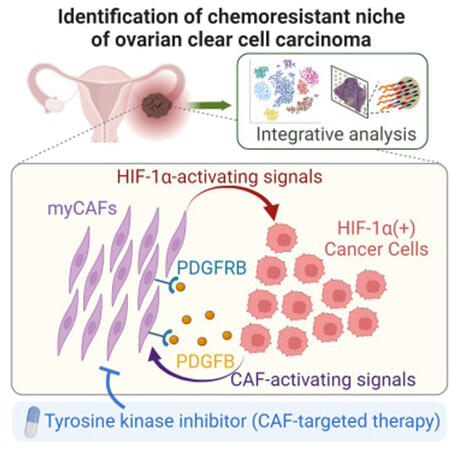In modern times, one in two Japanese is diagnosed with cancer in their lifetime. Because drug resistance of refractory cancer leads to life-threating recurrence and metastasis, there is an urgent need for elucidation of the mechanism of cancer chemoresistance.
A research group led by Dr. Koji Okamoto, a professor at the Advanced Comprehensive Research Organization, Teikyo University, has been conducting research on clear cell carcinoma, a type of ovarian cancer that has a relatively high incidence in Japan and is poorly responsive to anticancer drugs. The group previously discovered that clear cell carcinomas are heterogeneous in terms of susceptibility to anticancer drugs and that only some cells in cancer tissues are resistant to anticancer drugs.
Based on these observations, the research group conducted detailed studies, including spatial transcriptomics, and showed that that "cancer-associated fibroblasts (CAFs)," which are distinct from cancer cells, cooperate with some cancer cells expressing the transcriptional regulator "HIF-1" to induce resistance to anticancer drugs. Through the studies, they clarified the mechanism by which cancer cells activate CAFs, which in turn induce HIF-1 expression and drug resistance in cancer cells. Furthermore, they found that receptor tyrosine kinase inhibitors, which are used in cancer therapy, inhibited CAF activation. Remarkably, these inhibitors, combined with existing anticancer drugs, synergistically inhibited cancer cell growth.
Ovarian cancer is also known as a silent killer as it is difficult to be detected in its early stages. This study may lead to the development of novel therapeutic strategies targeting CAFs of clear cell carcinoma and other type of cancer.





